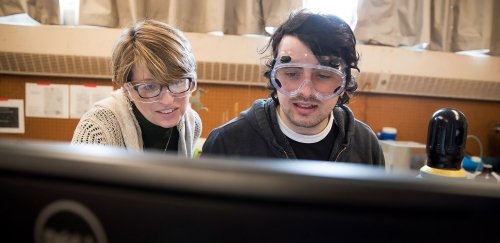
You don't have to be a total science geek to appreciate what goes on in the Department of Physical Sciences at Rhode Island College.
Enter the Clarke Science Building, home of the Department of Physical Sciences, and discover some of the most fascinating laws of nature.
Take physics for example. You probably know that we're all made up of atoms – protons, electrons and neutrons – and a whole bunch of empty space between them. If we were to remove that space in every human body, all of humanity would be as large as a cube of sugar. That's right. A cube with about a half-an-inch on each side. Physical science is fascinating like that.
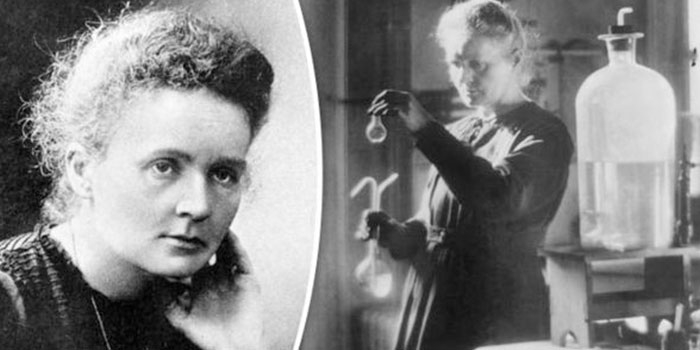
There are four main branches of physical science: physics, chemistry and Earth and space science. RIC's faculty are experts in all of these areas and work together on a daily basis. They believe that the challenges we face in our modern world require knowledge across all areas of science.
Research is a key component of the work faculty do, and almost all of their research is done in collaboration with students. The learning environment is both academically rigorous and student-centered, and the low faculty-to-student ratio means students have easy access to faculty to answer questions and to give advice. After four years, RIC students don't necessarily morph into a Madame Curie or Albert Einstein, but they do graduate with a superabundance of skills.
They've mastered knowledge in their field; research skills; laboratory skills, including the ability to collect and analyze data using a variety of instruments and computational techniques; they've learned to work cooperatively with their peers in the lab; they know how to communicate their scientific results in written and verbal form; and they understand the ethical responsibilities of a scientist.
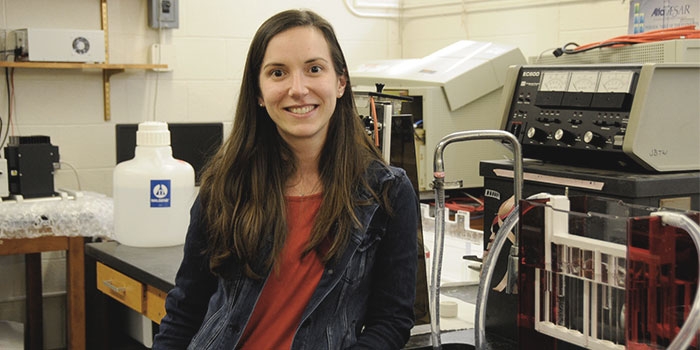
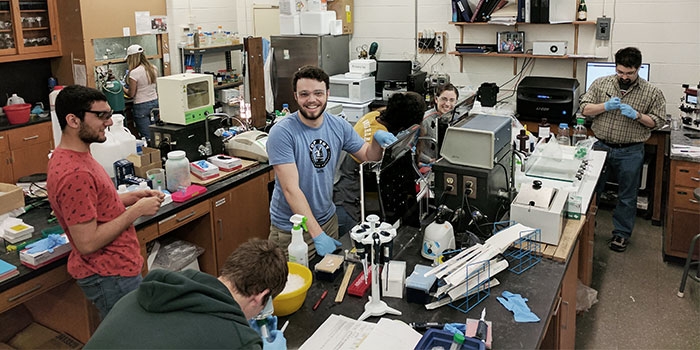
"My undergraduates are involved in all levels of my research, from generating ideas and hypotheses to carrying out experiments and interpreting the data," says Associate Professor of Chemistry and Biochemistry Jamie Towle-Weicksel. Towle-Weicksel's research work focuses on specialized proteins that work to protect our DNA from environmental damage.
"Specifically, we are studying a protein known as DNA polymerase theta, which specializes in repairing DNA damage caused by UV light," she says. "By understanding how this protein works, we hope to gain a better understanding of how the body repairs DNA damage and what happens when things go wrong."
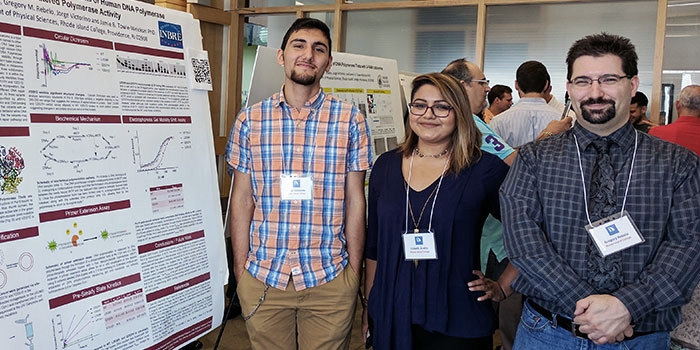
Upon graduation, some students continue their education in master's and doctoral programs. Others are now teaching chemistry and physics at colleges, universities and high schools, while others are working in the medical field or in industry.
Garrett Walsh '18, an environmental chemistry major, opted for graduate school after a year and a half of research work with Knowlton. "Once I got into research, I wanted to do more," he says.
Knowlton specializes in environmental chemistry and chemical oceanography. She is investigating the transport of road salt and its potential negative impact on the environment, particularly on Rhode Island freshwater systems. She is also working in collaboration with scientists at the University of Rhode Island Graduate School of Oceanography on the cycling of chemicals through the ecosystem and the effect of climate change on these cycles.
"Dr. Knowlton is by far one of the most important influences in my life," Walsh says. "I owe her a lot. In fact, I owe the entire department a lot. They were all fantastic teachers. I never expected to be so much further ahead in grad school compared to my peers, yet there I was sitting in class thinking, 'I know this material already.' I already learned it at RIC."
The doors of the department are open to all students, with courses offered to majors and non-majors alike. All you need is the scientific spirit. Scientists are passionate about asking the great questions and equally at home with uncertainty ... like Einstein.
An apocryphal story goes that one of Einstein's students once came to him puzzled, asking, "Dr. Einstein, aren't these the same questions we had on the exam last year?"
"Yes," Einstein replied. "But this year the answers are different."
Vive ciencias!
The Physical Sciences Department offers a B.S. degree in physics, a B.A. degree in chemistry and an ACS-certified B.S. degree in chemistry, with concentrations in environmental chemistry and biological chemistry. View the full list of faculty research.
Also see:
Six Grants in Six Years for Biochemistry Professor Jamie Towle-Weicksel
